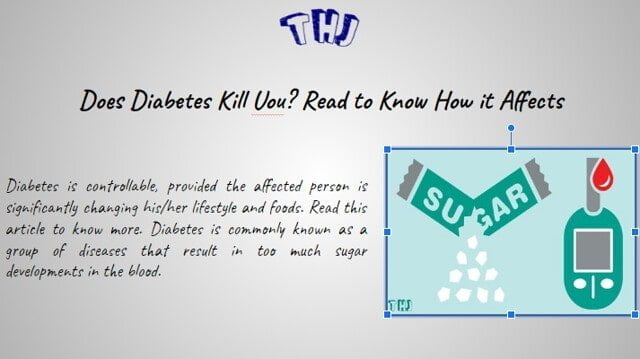How Diabetes Can Kill You and What to Look for

Did you know that diabetes can kill? It’s not just a condition that will hinder your ability to lead a fulfilling life, but also one that could cut it short. Diabetes is a disease that affects beta cells in the body, causing them to produce too little insulin (type 1 diabetes) or not respond to it properly (type 2 diabetes). In its milder forms, this condition will result in elevated blood sugar or glucose levels and a few complications like eye problems, nerve damage, and even kidney failure. However, if left untreated or in more serious cases, diabetes can kill you sooner than you think. Here are some of the risks of uncontrolled diabetes:
How Diabetes Can Kill You, Check some of the risks of uncontrolled diabetes
By producing too much blood sugar, diabetes can cause the body to deteriorate quickly.
When your blood sugar levels are controlled, they are transported from the digestive tract into the bloodstream where they are used by the cells in the body for energy production. However, when there’s too much sugar in the bloodstream, it will be excreted through urine or sweat, and the rest of it is stored as energy for future use in your liver and muscles. This process is known as glycogenesis. That’s why people with diabetes often urinate a lot and sweat excessively. As the glycogen stores in the liver become depleted and the glucose in the blood doesn’t get used up, it will be reabsorbed into the bloodstream. The body has a fail-safe mechanism that is activated when there’s too much glucose in the bloodstream. It will result in low blood pressure, blackouts, and even coma or death.
Lack of insulin or its inability to respond properly can lead to deadly levels of blood sugar.
Insulin is a hormone that’s produced in the pancreas to regulate blood sugar levels. When you eat, the digestive tract breaks down food into sugar, which is absorbed into your bloodstream. The insulin produced in the pancreas is stored in beta cells and released in various amounts to regulate blood glucose levels. As your blood sugar levels rise, the insulin is released to take it back into the cells. If you have type 1 diabetes, your pancreas will stop producing insulin altogether, which means you’ll have to inject insulin to regulate blood glucose levels. If you have type 2 diabetes, your cells will stop responding to the insulin, meaning you have to take medication to help it work properly.
Diabetes can cause heart problems, which could lead to death.
Heart problems in people with diabetes can occur due to several reasons, including the following: – Excessive levels of glucose in the bloodstream – High levels of cholesterol and triglycerides – Oxidized LDL cholesterol – Increased blood pressure – Abnormal heart rhythms People with diabetes are twice as likely to have a heart attack compared to those without diabetes. If you have diabetes, your risk of death from heart disease is three times higher than someone without diabetes. The risk of stroke is also higher for people with diabetes. A heart attack occurs when a clot blocks an artery that carries blood to the heart. If a clot breaks loose, it could travel to the brain, causing a stroke.
Read: Good oral hygiene practice: essential for tooth decay prevention
Nerve damage caused by diabetes can be fatal for many people with this condition.
Nerve damage is one of the most common complications in people with diabetes. It happens when the blood glucose levels are too high for too long, resulting in damage to the cells in the body, including the nerves. Nerve damage can cause pain and numbness in the limbs or even complete loss of feeling in some parts of the body. Nerve damage can be reversed when detected early, but it can also lead to permanent disability or even death.
READ: How to Avoid Diabetes: 5 Tips to Prevent, Delay, or Combat Type 2 Diabetes
Conclusion
If left untreated, diabetes can kill you. The good news is that you now know some of the risks of uncontrolled diabetes. It’s important for people with a family history of diabetes to get screened early. If you have early signs of diabetes, make sure you consult your doctor to get the condition under control. You don’t want a routine condition like diabetes to take your life prematurely.
| LATEST EDUCATION STORIES |
| [display-posts posts_per_page="10" include_date="true"] |
| View All Breaking News → |


 Why MTN Ghana’s Ghs399 Bundle is the Best Data Deal in 2026
Why MTN Ghana’s Ghs399 Bundle is the Best Data Deal in 2026  CAGD Salary Suspension 2026: Deadlines and Actions for Affected Staff
CAGD Salary Suspension 2026: Deadlines and Actions for Affected Staff  A Plus Defends Paternity Fraud Bill: “Stand Up for the Brotherhood”
A Plus Defends Paternity Fraud Bill: “Stand Up for the Brotherhood”  Ghana to Criminalize Paternity Fraud as ‘A Plus’ Proposes Mandatory DNA Testing Bill
Ghana to Criminalize Paternity Fraud as ‘A Plus’ Proposes Mandatory DNA Testing Bill